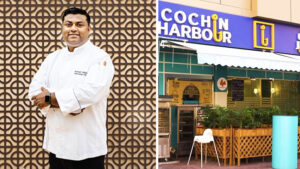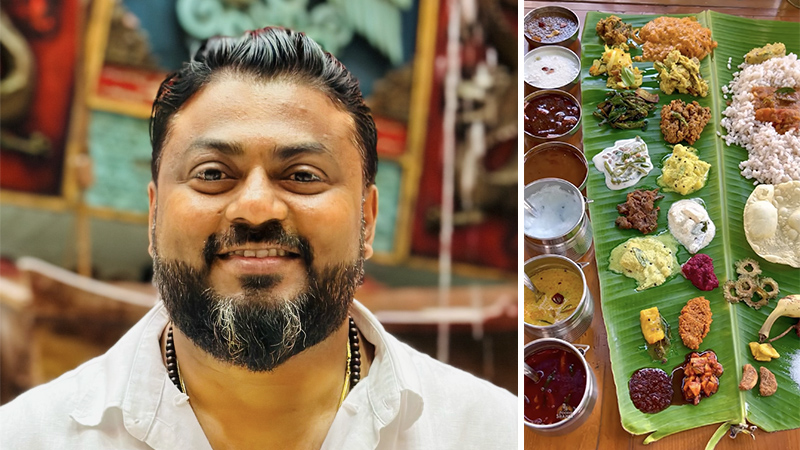Tucked away in a corner of bustling Karama — the Dubai district that’s frequently equated with London’s Southall or New York’s Jackson Heights or Singapore’s Little India — is the unpretentious, hole-in-the-wall Cochin Harbour, owned by Avinash.
Cochin Harbour opened last year and broke even in 6 months: a tough ask — ask anyone in the F&B industry. And significantly, in a year and a half, it has established itself as the go-to destination for anyone looking for authentic food from Kerala… rising definitively above the clutter in a city that is home to a slew of restaurants serving Malayali food (the Malayali diaspora forms the largest chunk of the formidable force of Indian expats in Dubai).
NRIFocus caught up with chef Avinash to understand his passion — and his success story. Avinash — whose latest honour has been the RetailME’s Food Service Icons award — has his roots in Kerala; he grew up in north India, lived and worked in diverse markets, and headed the F&B operations (as part of Emaar) during Dubai Expo.
The first thing that strikes you about him is that, unlike most celebrity chefs, he never talks about a real fascination with food from an early age. His grandfather was a great cook, he says, and he has wonderful memories of family feasts and being excited about helping with food preps — but, as a kid, he wanted to be a soldier (almost every male member in his family except his father were in the Indian Army).
Somewhere, somehow, he had a change of heart and decided to study engineering. “I dropped out in a year’s time because I couldn’t find the passion, and applied to the Pusa institute of hotel management (in Delhi) because some of my friends were doing that. I got selected, completed the course and passed out in 2001, and then I enrolled at The Oberoi Centre of Learning and Development for a PG degree, specialising in F&B.” By his own admission, he found cooking “adventurous”; he enjoyed matching flavours with ingredients as he dipped his hand into world cuisines. “Italian cuisine was my favourite back then.”
It was on his second job at the Rambagh Palace in Jaipur when he got into the thick of Indian food. And he did it so well that one day a guest walked up to him to ask whether he wanted to move to Ireland. “This gentleman owned an Indian restaurant in Dublin,” Avinash recalls, “and he liked my food so much, he invited me to come on board.” He moved to Ireland, and, after a year, joined Four Seasons in Dublin.
In 2008, when the recession hit, he bucked the trend and started his own restaurant, Mantra, with a close friend as his partner. Mantra went on to win Best Ethnic Restaurant award the next year, and Avinash and his friend opened their second restaurant, Indian Brasserie, in quick succession.
But soon after, he had to sell off his share to his friend and return to India when his mother fell ill (“Mantra closed down a few years later but Indian Brasserie is still going strong”). In India, Avinash did a stint with the Leela Palace in Chennai, before moving to Kenya to work for the Fairmont group.

The Dubai dream
2014 was the year when Dubai beckoned. Avinash got the opportunity to be part of the culinary division of Emaar’s The Address group and, during Expo, headed the F&B operations of the six-month-long event. Handling operations of such magnitude and gaining insights on the sector gave him the perfect launch pad to take a leap of faith. Cochin Harbour was born.
“I was very clear: I wanted to target the Indian market with a simple value proposition — very, very authentic flavours, it had to remind my clients of where they come from.” He didn’t want to “adapt” to the market; “I wanted to just curate and create real food, I believed real food will definitely be liked, and that’s exactly what happened.”
Affordable pricing had to go hand in hand. “If there’s one singular attribute Indian diners have the world over it is that they are price-sensitive… In my professional life, I’ve mostly worked in the five-star, fine-dining sector, so with Cochin Harbour, I wanted to offer the same quality at a price the masses could afford.” Most famously, he offers a mini Sadya meal during Onam for Dh10, which has become a huge hit across the city.
Recently, Avinash opened his second restaurant, Rasam, in Dubai. Rasam is located in Discovery Gardens, at the other end of the city, a part referred to as New Dubai. What connects the dots between Karama and Discovery Gardens — other than a long stretch of Dubai’s arterial Sheikh Zayed Road — is that they are both Indian mainstays even though he maintains he’s chuffed when non-Indians tell him they’ve become his fans.
Rasam, unlike Cochin Harbour, is casual dining, larger, more ambient, and also factors in a more pan-Indian cuisine (“a dash of north Indian” as Avinash points out), but the price tags ensure value-for-money remains the driving catchment. Is he a hands-on cook? And is he a control freak? Not really, says Avinash. His team has been trained well, and all his recipes are standardised so the margin for error is minimal, it’s a practice he’s imbibed from his ‘organisational’ days in F&B. “All systems are in place.”
Avinash’s secret sauce
The single word he would put down as being his recipe for success is “action”. “You know, there are all these pick-me-up words and motivational books and inspiring quotes — but I realise unless and until we translate words into action, nothing is going to work… That’s something I swear by: consistency of action… that’s the key.”
If Avinash had to put up his feet for a bit and be more philosophical, he’s likely to say what also works for him — consistently — is he caters to his diners’ homing instincts… the diners who retain India in their hearts. As an example, he points out that back home, if you go to your village “especially in Kerala”, your grandma’s fish curry comes in the same pot in which it’s cooked, and everyone takes their share from the same pot — that’s what being a family is all about.
“I’ve tried to replicate the same concept here so that it literally brings out the same emotions you find at home. Food cooked in a pressure cooker is brought to the table as is, and the lid is uncovered in front of diners — to reinforce that it’s ‘homemade’ and authentic, straight from the stove with no stops in between, and served on banana leaves.” The fact that “there’s no bulk cooking and everything is customised” obviously helps.
Every two or three months, Avinash makes a trip to India to pick up spices and condiments from Kerala. All his utensils and cooking gear is from back home in Kerala. “I think all that effort helps put together an authentic dining experience.” The one time Avinash’s eyes welled up while at work was not when fumes from the kitchen got to him; it was when an emotional customer told him the food reminded her of her grandmother’s cooking back home in Kerala. — Sushmita Bose is Managing Editor of nrifocus.com


Leave a Reply